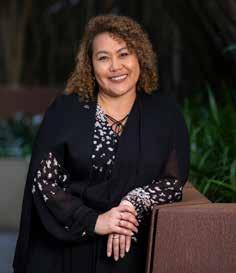
3 minute read
FROM THE CEO
CEO Karen Mundine. Photo: Joseph Mayers
2021 marks an important milestone in Australia’s reconciliation journey: 30 years ago, the Royal Commission into Aboriginal Deaths in Custody presented its final report to the Australian Government and people.
The Commission was established due to rising public outcry and concern that Aboriginal and Torres Strait Islander people were dying in incarceration, in ways that could not be explained.
Ultimately, the report concluded that while First Nations Australians were not more likely to die in custody, they were, however, twenty times more likely to be incarcerated than non-Indigenous Australians were.
It is a direct result of that initial public outcry and advocacy that the Royal Commission continues to be the benchmark against which we still understand and contextualise Aboriginal and Torres Strait Islander incarceration today. At marches and vigils across the country, the number chanted through megaphones, painted on t-shirts and held high above heads is known and accessible to us because of those in the beginning who bravely stepped forward and demanded an investigation.
Public action is critical and has the power to transform our knowledge, our circumstances and our nation, but it must be constant, and it must continue to hold our leaders and our systems accountable. At the time of writing, the two months since our cover photo was taken, there have been seven more Indigenous deaths in custody.
The final recommendation of the Royal Commission called for all political leaders to support a reconciliation process, which created the Council for Aboriginal Reconciliation—Reconciliation Australia’s predecessor. In the 30 years since then we have expanded that idea to call on all leaders across Australian society to support the process of reconciliation.
In Reconciliation Australia’s 20th anniversary year, our theme is More than a word. Reconciliation takes action. It urges the reconciliation movement to braver more substantive action.
This theme acknowledges the findings of the 2021 State of Reconciliation in Australia report, which found increasing knowledge in the Australian public about issues affecting Aboriginal and Torres Strait Islander peoples, but now, after two decades of Reconciliation Australia, this awareness must motivate us to braver action. Edition 45 of Reconciliation News consequently brings you stories to help you reflect on this year’s theme and consider what you can do this National Reconciliation Week (NRW) to move from safe to brave on issues affecting Aboriginal and Torres Strait Islander peoples.
Inside, you will find the official NRW poster, featuring artwork by Warumungu/ Wombaya woman and owner of Nungala Creative, Jessica Johnson. We encourage you to celebrate and promote the week by displaying the poster in your communities and workplaces.
We bring you the story of the trailblazers of First Nations photography in Australia; as well as take a look at a new campaign, Learn Our Truth. Shelley Reys AO reflects on 20 years of Reconciliation Australia, and RAP Partner Transport for NSW tells us what it’s like to look at the hard and uncomfortable truths of the places in which they operate. Historian Grace Karskens, in collaboration with Darug Traditional Owners and researchers, explains the importance of naming Country and the work they are doing to raise awareness of Darug presence and history in the wider community.
This National Reconciliation Week and beyond, we reflect on the path we’ve taken to this point and thank those who have walked with us. As we face the challenges of the next 20 years, I encourage all to engage, learn, speak up and take braver, more impactful actions to advance reconciliation.

Karen Mundine Chief Executive Officer










